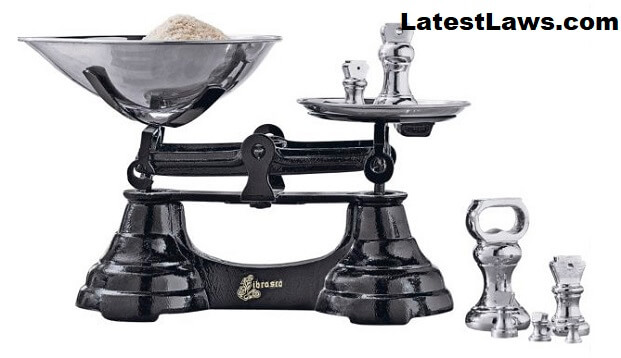This article is written by Vasundhara Thakur, from IME Law College. This article explains the enactment of the Legal Metrology Act, 2009 which is governed by the Ministry of Consumer Affairs to spread awareness and transparency among the consumers in the context of weights and measures.
Table of Contents
Introduction
We all are consumers in one mode or the other. Each day, we conduct a transaction with commercial entities. However, it is relevant to know whether we are getting our money’s worth. Thus, to strengthen the confidence of the public and guarantee that it obtains value according to the established standards, the law on legal metrology was promulgated.
“Metrology” can be defined as a tool for measurement. Legal metrology is that branch of law that deals with units of weights and measures in trade and commerce and goods sold or distributed by weight, measures, or numbers. It monitors the accuracy of weights and measurements and ensures its compliance with the Act and other technological standards.
The Act was introduced to replace the Standard of Weights and Measures Act, 1976, and the Standards of Weights and Measures (Enforcement) Act, 1985. The provisions of the Act came into force on April 1, 2011. The Act was enacted to set standards of weights and measures in trade and commerce and to guarantee the public the security and legality in the goods or services of a proprietor.
The Legal Metrology (Packaging Commodities) Rules, 2011 apply to packaged products and specify how declarations must be made and what declarations must be included in a packaged commodity intended for sale.
The salient feature of the Act
- The Act specifies the metric system as the units of weights and measures which must be in accordance with the international system of units.
- According to Section 5 of the Act the base unit of weights and measures are as follows:
- for length- meter,
- for mass-kilogram,
- for time – second,
- for electric current – ampere,
- for thermodynamic temperature- Levin,
- for luminous intensity -Candela,
- for the amount of substance – mole.
- The base units for numeration are defined as the international form of Indian numerals, numeration shall be made in accordance with the decimal system, as specified under Section 6.
- Any custom, usage, practice, or method apart from the manner prescribed in the Act which is contrary to the Act shall be void.
- The Act empowered the Central Government to form rules as and when required.
- The Act provides the union Government power to appoint a Director of Legal Metrology to perform duties related to inter-state trade and commerce, and the Act also provides that the State Government shall appoint a Controller of Legal Metrology to perform duties related to intra-state trade and commerce.
- A person dealing in manufacturing or importing shall get the approval of the model of weight and/or measure before manufacturing or importing from the competent authority.
- An importer needs to get themselves registered with the concerned Director.
- All the manufacturer, repairer, and seller need to obtain a license from their respective Controller.
- The Act also allows test centers to verify weights and measures approved by the Government.
- Any non-standard weights and measures shall not be imported.
Major stakeholders under the Act
The major stakeholders under the Act are:
Manufacturer:
According to Section 2(i), in relation to any weight or measure, a “manufacturer” is a person who manufactures the weight or measure, or one or more parts thereof, and acquires other parts of the same weight or measure, and then claims the end product to be a weight or measure manufactured by himself or itself, as the case may be.
Dealer:
According to Section 2(b), a dealer is a person who, directly or indirectly, takes on the business of buying, selling, supplying, or distributing any such weight or measure, whether for cash or deferred payment.
Importer:
An importer is a person who bought goods from a foreign territory for selling, distributing, or/and delivering the goods.
Repairer:
According to Section 2(p), a repairer is a person who repairs, cleans, adjusts, lubricates, or paints the weight and measures to ensure the standards established by the Act.
Licenses for manufacturer, repairer, and dealer of weights & measures items
The Act under Section 23 makes it mandatory for the manufacturer, repairer, and dealer to obtain a compulsory and valid license issued by the Controller if he/she wishes to sell or offer, expose or possess for repair or sale, any weights and measures. However, a repairer does not require a license to repair his weights and measures in a state other than the state of the manufacturer.
The Controller shall issue the license in the prescribed form and manner, on such prescribed condition on payment of the relevant fees.
Licencing of the manufacturer, repairer, and dealer of weights and measures
- An application for the issue of a license has to be made by every manufacturer, repairer, dealer, in weight and measures to the controller of Legal Metrology or any such officer as may be authorized by him on his behalf, in the appropriate form set out in Schedule II-A. It is pertinent to note here, that if a manufacturer/repairer/dealer operates his/her business in the Sixth Scheduled areas of Meghalaya, he must obtain a Trading license from the respective autonomous District Councils of the State of Meghalaya.
- Every manufacturer, repairer, or dealer in weight and measure shall apply for renewal of licenses within thirty days before the expiry of the validity of their licenses, making an application to the Controller Legal Metrology or such officer authorized by him on his behalf, in the form set out in Schedule II-B.
- A manufacturer, repairer, or dealer must be awarded a license in the form specified in Schedule III.
- The license issued shall be valid for a period of a minimum of one calendar year and may be renewed by the Controller or any such authorized authorities for a duration of one to five years upon payment of the yearly fees set forth in Schedule IV.
- For the issuance of a duplicate license or alteration of a license, the fee shall be half of the license fee as specified in Schedule IV. In case, the applicant makes an application for the renewal of the license within three months from the date of expiry of the license, an additional fee at the full rate as specified in Schedule IV shall be payable by the applicant to the Controller.
- Schedule V provides that the Controller or any such person authorized shall maintain a register of licensed manufacturers, dealers, and repairers.
- The manufacturer, repairer, or dealer who is licensed under these Rules shall maintain such workshop/ equipment/ tools/ register as the case may be, as per the terms and conditions of the license.
- A security deposit must be furnished to the State Government for each license by the repairer, licensed under this Act and Rules as specified in Schedule VI.
- The issued license shall be displayed on the premises where the licensee carries his/her business.
- A license once issued under this Act is non-transferable and/or saleable.
Suspension and cancellation of the license granted
- In case, any holder of the license makes any statement which is false or incorrect in any material particular or has contravened any provision of the Act or any rule, then the Controller or any other officer authorized by him may order to revoke or suspend the license. However, a reasonable opportunity shall be given to the holder to show cause against such an order. Further, if the inquiry is not completed within three months from the date of suspension of the license, such suspension shall stand vacated on the expiry of such period.
- When the Controller is satisfied after the inquiry that the holder of the license has contravened any law or has made false or incorrect statements of any nature mentioned under sub-rule (1), he shall cancel the license. However, reasonable opportunity shall be given to the license holder to show cause against such an order.
- The licensee shall immediately stop functioning and shall not resume business after his/her license got suspended.
- Every licensee, whose license was suspended shall surrender their license to the competent authority.
- Every licensee after the suspension of their license shall dispose of their weights and measures within a period of thirty days, or any such further period, which shall not exceed three months. In case, he/she fails to do so then the Controller or any such authority or officer authorized on his behalf, in writing, may seize and dispose or distribute, as the manner prescribed.
Documents to be furnished by the manufacturer at the time of acquiring a license
Every manufacturer must acquire a valid license by applying with the respective Inspectorate Offices in a prescribed form (Form LM-1) along with the prescribed attested documents mentioned below:
- A proof of identity preferably issued by the government offices.
- Two passport-size photographs.
- Certificate of registration of Industry.
- Non-objection certificate from the competent Authority.
- Document showing the ownership or lease agreement of the premises used for manufacture.
- The partnership deed in case of a partnership firm or Constitution in case of proprietorship or Registration documents of the company along with the Article and Memorandum of Association.
- List of machinery, tools, and accessories along with the list of purchase invoices and bills.
- Test weights purchase bill in case of a new verification certificate.
- Model Approval Certificate.
- Trademark, Monogram registration Certificate from Competent Authority.
- GST Registration Certificate.
- Professional Tax Registration Certificate.
- Valid Labour Licence.
This list of documents is not exhaustive and it would be changed according to the category of registration.
Renewal of licenses
The applicants who wish to renew their manufacturing licenses are required to submit FORM LM-2 along with the following documents:
- The original manufacturer license.
- Certificate of GST registration.
- Labour license.
- Verification certificate of test weights.
- Valid Trading Licence in case of Non-tribal state.
- Professional tax registration.
This list is not exhaustive and is subject to the category of registration which shall be changed accordingly.
Offenses and penalties
The offenses and penalties are specified in the Act under Chapter V of the Act.
- Section 27 of the Act provides punishment for manufacture or sale of sub-standardized weights and measures which can be punished with a fine of rupees twenty thousand and for the second subsequent offense for a period which may extend to three years or with fine or both.
- In case, a person makes any transaction, deal or contract in contravention of the standard of weights and measurement then they will be punished with a fine which may extend to rupees ten thousand and for second subsequent offenses with imprisonment for a term which may extend to a year or with fine or both as specified under Section 28 of the Act.
- Section 36 (1) of the Act provides punishment for non-standardized packages concerning manufacture, packaging, or selling of goods with a fine which may extend to fifty thousand rupees, for second subsequent offense a fine which may extend to one lakh rupees or imprisonment for a term of one year or both.
- Section 36 (2) of the Act provides punishment for error in packaging, importing, or manufacturing any pre-packaged product. The punishment may be a fine of rupees ten thousand which may extend to rupees one lakh or with an imprisonment of one year or with both.
- Section 38 of the Act provides a penalty for non-registration by the importer of weight or measure. The offense is punishable with a fine which may extend to twenty-five thousand rupees and for the second subsequent offense imprisonment which may extend to six months or with fine or with both.
Compounding of offenses
Section 48 of the Act deals with the compounding of offenses which are punishable under Section 25, section 27 to Section 39, Sections 45 to 47 or any rule made either before or after the institution of the prosecution on payment for credit to the government of such sum as may be prescribed. The sum should not exceed the maximum amount of the fine imposed under this Act.
Offenses by companies:
According to Section 49 of the Act, any company may, by order in writing, nominate directors to be responsible for preventing the company from any offense or the company has to intimate to the Legal Metrology Authority in a prescribed manner indicating such director has been nominated along with written consents and where the company has other establishments, the person responsible shall be nominated. Provided further, that the nomination be continued till the Director ceases to a director or any cancellation notice is received from the company or the nominee himself requests to cancel the nomination.
The company so convict under this Act for any contravention thereof, the penalty will be published as an advertisement in the newspapers at the expenses of the company as directed by the court.
Appeal
The Appeals can be filed to the next higher authority against all decisions or orders of an officer of legal Metrology within sixty days from the day of the passing of such an order or decision as specified under Section 50 of the Act.
Conclusion
Hence, from the above discussion, it is concluded that the Legal Metrology Act was enacted to keep in check the weights and measures in the products/goods and only the stakeholders have authority to manufacture, repair or deal with such products or import in the market with a valid license, any contravention to the Act is an invitation to penal offenses.
References
LawSikho has created a telegram group for exchanging legal knowledge, referrals, and various opportunities. You can click on this link and join:
https://t.me/joinchat/J_0YrBa4IBSHdpuTfQO_sA
Follow us on Instagram and subscribe to our YouTube channel for more amazing legal content.
 Serato DJ Crack 2025Serato DJ PRO Crack
Serato DJ Crack 2025Serato DJ PRO Crack









 Allow notifications
Allow notifications


